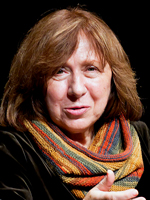 Svetlana Alexievich at a discussion Feb. 8, 2011 in the Roter Salon in Berlin. Courtesy/wikipedia.com
Svetlana Alexievich at a discussion Feb. 8, 2011 in the Roter Salon in Berlin. Courtesy/wikipedia.com
NOBEL PRIZE News:
The Nobel Prize in Literature 2015 is awarded to Svetlana Alexievich “for her polyphonic writings, a monument to suffering and courage in our time”.
Alexievich was born May 31, 1948 in the Ukrainian town of Ivano-Frankivsk, as the daughter of a Belarusian father and a Ukrainian mother. When the father had completed his military service, the family moved to Belarus, where both parents worked as teachers.
After finishing school, Alexievich worked as a teacher and as a journalist, and she studied journalism at the University of Minsk between 1967 and 1972.
After her graduation she was referred to a local newspaper in Brest near the Polish border, because of her oppositional views. She later returned to Minsk and began an employment at the newspaper Sel’skaja Gazeta. For many years, she collected materials for her first book U vojny ne ženskoe lico (1985; War’s Unwomanly Face, 1988), which is based on interviews with hundreds of women who participated in the Second World War. This work is the first in Alexievich’s grand cycle of books, “Voices of Utopia”, where life in the Soviet Union is depicted from the perspective of the individual.
By means of her extraordinary method – a carefully composed collage of human voices – Alexievich deepens our comprehension of an entire era. The consequences of the nuclear disaster in Chernobyl 1986 is the topic of Černobyl’skaja molitva (1997; Voices from Chernobyl – Chronicle of the Future, 1999). Cinkovye mal’čiki(1990; Zinky Boys – Soviet voices from a forgotten war, 1992) is a portrayal of the Soviet Union’s war in Afghanistan 1979–89, and her work Vremja second chènd (2013; “Second-hand Time: The Demise of the Red (Wo)man“) is the latest in “Voices of Utopia”. Another early book that also belongs in this lifelong project is Poslednie svideteli (1985; “Last witnesses”).
Important influences on Alexievich’s work are the notes by the nurse and author Sofia Fedorchenko (1888–1959) of soldiers’ experiences in the First World War, and the documentary reports by the Belarusian author Ales Adamovich (1927–1994) from the Second World War. Because of her criticism of the regime, Alexievich has periodically lived abroad, in Italy, France, Germany, and Sweden, among other places.

